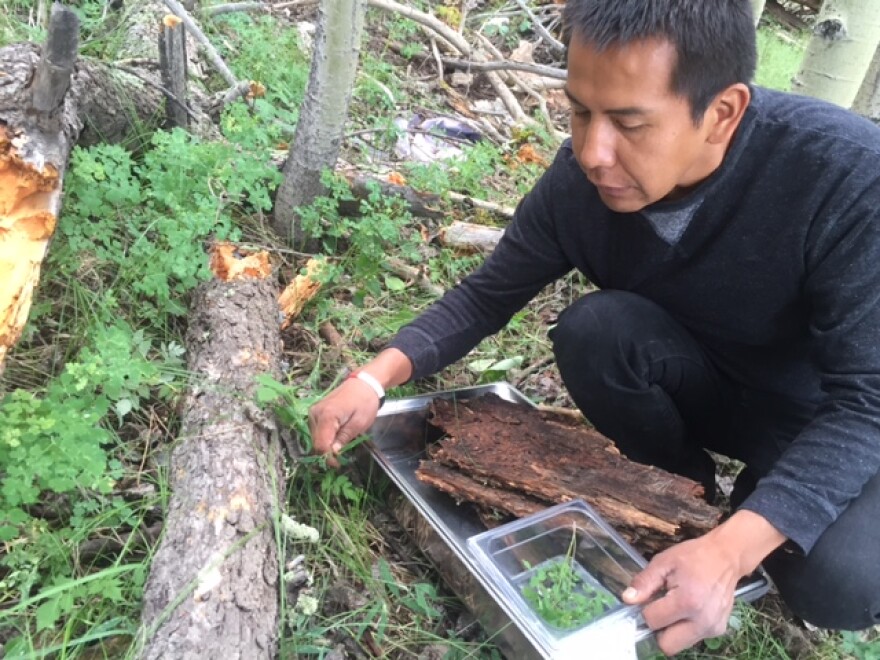A chef in eastern Arizona wants to save the cuisine of his ancestors. Nephi Craig is a member of the White Mountain Apache Tribe. He believes food can help his people recover from a dark past that includes war, relocation, and a food-related health crisis. Arizona Public Radio's Aaron Granillo reports.
Nephi Craig’s early training was as a classical French chef, but that never felt right to him. He wanted to be authentic to his heritage.

"If I’m going to be a chef, I want to be a Western Apache chef cooking in our sacred mountains," says Craig. "That makes the most sense. The best truth comes out."
Craig is now head chef at the Sunrise Park Lodge in the White Mountains, where he was born. He makes high end dishes that reflect the Apache’s culinary past. On a recent morning, Craig shows a technique called parching. He swirls locally harvested white corn kernels in a hot sauté pan.
"So this would be one of the preservation methods that our people have been using. It’s real old school," says Craig. "Time immemorial, man. But, real powerful taste memories for a lot of Apache people, especially me too."

The corn will be used for today’s tasting menu, which includes quinoa salad, cured salmon, and pastries topped with piñon-infused whipped cream -- all prepared by Craig’s hand-chosen team of Native American cooks.
"It’s about sharing this information within our native communities because we are the ones that really need to understand our historical trauma in order to heal and recover from it," says Craig. "Food is a really honest way to articulate that history."
The White Mountain Apache’s way of life was uprooted in the late 1800s, when the US Army used their land as a military post. They lost their freedom to hunt, gather, and farm. During that time, many tribes across the country were forced to accept food rations from the federal government.

"What happened was people were starving," says Lois Ellen Frank, a Kiowa Indian and a culinary anthropologist. "And that’s when the government stepped in and said, okay, we have to issue these commodity foods. These foods to keep you alive until you get to know your new environment."
Frank says it completely changed their diet. Lard, canned meats, and processed sugars were issued to people who had always lived off the land.
"With the diet changing, there are health adversities. And it’s during this period that we see obesity. We see health disparities. We see diabetes," says Frank.
The US Health and Human Services Department says today, nearly 20% of Native Americans have diabetes, and nearly half are considered obese. Those are the highest rates in the country among any ethnic group.
Craig believes that can change if more American Indians embrace their food history.

Craig forages for oxalis on a mountainside, just a few steps behind the restaurant. It's a wild edible that tastes just like green apple, he says. He’ll use it in today’s dessert.
Clayton Harvey helps him gather. He’s a local Apache farmer, who often delivers his fresh produce to Craig’s kitchen.
"For a long time, we lived strong, and sustained ourselves off of the land," says Harvey. "In Apache, the word for land and mind is the same word. It’s called Ni. That shows the direct relationship that we had with the land."
Harvey believes that relationship can still exist, and rejects the idea his reservation is a so-called “food desert.” It’s a label given by the federal government to describe areas with few markets that sell fresh food.

"We have food all around us just like what we’re doing now. You know, we’re out and collecting food, and these are foods that our ancestors have lived off of, so there’s food out there, and it benefits us, " says Harvey. "It’s just that we need to educate ourselves."
Harvey brings his bounty back to the kitchen, where chef Craig makes Western Apache Seed Mix. It has pine nuts, amaranth, pumpkin seeds and the corn he parched earlier.
"This would have been put in pouches and carried long distances and eaten to stave off hunger. To me, this is more luxurious than, say, caviar or foi gras or truffles," says Craig. "It’s cultural, historic, nutritional, scientific. You got to know the story and be able to tell that and pass it on."

Craig founded the Native American Culinary Association to do just that. Since 2000, he’s been bringing together indigenous cooks from across the country to share and teach their food traditions.
"I would like to see, like, amazing native restaurants in native communities, as an example of economic enterprise, development, education, nutrition," says Craig. "I think that it needs to be practiced with a solid relationship with native peoples if it’s going to be practiced."
About 20 people are gathered at the restaurant to sample Craig’s menu. They pass around small plates of different foods, like chili marinated avocado.

As they eat, chef Craig tells them indigenous food is a vast universe, full of soul and meaning. He hopes they’ll leave feeling the same way, nourished both physically and spiritually.





